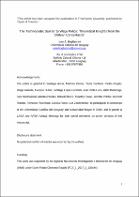JavaScript is disabled for your browser. Some features of this site may not work without it.
Mostrar el registro sencillo del ítem
The technocratic barrier to wage policy: theoretical insights from the Chilean Concertación
| dc.contributor.author | Bogliaccini, Juan Ariel | |
| dc.date.accessioned | 2021-02-25T19:38:07Z | |
| dc.date.available | 2021-02-25T19:38:07Z | |
| dc.date.issued | 2020 | |
| dc.identifier.uri | https://hdl.handle.net/10895/1445 | |
| dc.description.abstract | During the Latin American left turn, most governments rapidly understood the importance of committing to macroeconomic equilibriums, successfully managing to combine this goal with a wide array of social policies. Wage policy proved to be a conflictive arena coming from a period of harsh austerity measures. This article provides unique insights, from the Chilean Concertación governments (1990-2010) about the importance intra-left conflicts had in the advancement of labor collective rights. The working hypothesis is that the conflict between party leaders and technocrats alongside a perceived trade-off between growth and distribution is a prime factor for understanding wage reform outcomes. The analysis relies on a mixed-methods approach combining regression analysis and process-tracing. Chile’s labor reform attempts during the Concertación governments, with feeble societal linkages, provides relevant theoretical insights for the understanding of how the abovementioned perceived trade-off may have played in other cases, not only in Latin America but also in other regions of the developing world. The analysis is novel in bringing intra-left conflict back in as an important driver for labor relations reforms and improves our understanding of the political economy of intra-left conflicts during the post-neoliberal period. | es |
| dc.language.iso | en | es |
| dc.subject | Chile | es |
| dc.subject | Política salarial | es |
| dc.subject | Trabajo | es |
| dc.subject | Reforma laboral | es |
| dc.title | The technocratic barrier to wage policy: theoretical insights from the Chilean Concertación | es |
| dc.type | Artículo | es |
Ficheros en el ítem
Este ítem aparece en la(s) siguiente(s) colección(ones)
-
Artículos [51]


